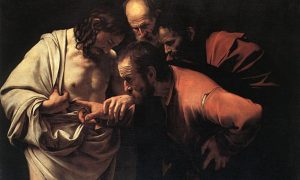 There’s an interesting article discussing the origin of our belief that Tertullian wrote, “I believe because it is absurd”, at aeon.com,
There’s an interesting article discussing the origin of our belief that Tertullian wrote, “I believe because it is absurd”, at aeon.com,
‘I believe because it is absurd’: Christianity’s first meme
by Sam Dresser.
The article is another warning not to thoughtlessly take on board popular “knowledge” that “everyone knows to be true”.
I learned of it through another discussion, one on the Westar Institute site, clarifying the diverse meanings of the word “faith” by Bernard Brandon Scott, The Trouble with Faith.
If you enjoyed this post, please consider donating to Vridar. Thanks!

Great article, thanks for the link Neil.
People will believe something no matter how absurd or impossible it is as long as it agrees with what they WANT to be true.
One thing I am learning from Vridar and other sites is that you should look for evidence that disproves what you think or want to be true.
• “People say they love truth, but in reality they only want to believe what they love, to be true.” —Myself
• “There is nothing easier than self-delusion. Since what man desires, is the first thing he believes.” —Demosthenes (c.333 BCE)
Voltaire (1765) [now bolded and formatted]. “ONZIÈME LETTRE. – Écrite par Mr. Théro à Mr. Covelle.“. Collection des Lettres sur les Miracles, écrites a Genève et a Neufchâtel (in French). pp. 136–137:
The above Voltaire (1765) quote is the source of the widely used paraphrase (often mis-attributed as a direct quote): Those who can make you believe absurdities, can make you commit atrocities.
Harrison, Peter (2017). “”I Believe Because it is Absurd”: The Enlightenment Invention of Tertullian’s Credo”. Church History. 86 (02): 339–364. doi:10.1017/S0009640717000531.
Voltaire (1728) [1726]. Le dîner du comte de Boulainvilliers. Par Mr. St. Hiacinte. (in French). p. 32. “C’est pourtant ce ridicule que St. Augustin a trouvé divin; il disoit, je le crois parce que cela est absurd, je le crois parce que cela est impossible.”
Voltaire (1879) [1764]. “Foi”. Dictionnaire Philosophique (in French). Œuvres complètes III. p. 158. “La foi consiste . . . à croire les choses parce qu’elles sont impossibles…”
“NPNF1-07. St. Augustine: Homilies on the Gospel of John; Homilies on the First Epistle of John; Soliloquies”. http://www.ccel.org. Tractate 29 on John 7.14-18:
Cf. “Credo ut intelligam“. Wikipedia.
See everyone, the celebration of ignorance didn’t begin in the US afterall.
Many atheists still quote Seneca as saying “Religion is true to the masses, false to the wise, and useful to the rulers,” even though he never said it. It’s still true, though.
• Farrar appears to be the source of the Seneca mis-attribution.
Gibbon, Edward (1840) [1776–1789] [now bolded]. The History of the Decline and Fall of the Roman Empire. p. 27:
Farrar, Frederic William (1881). “State of Roman Society – Seneca”. Seekers After God. Macmillan & Company. p. 45:
Hubbard, Elbert (1903). “Seneca”. Little Journeys to the Homes of Great Philosophers. XIV. The Roycrofters. p. 60: